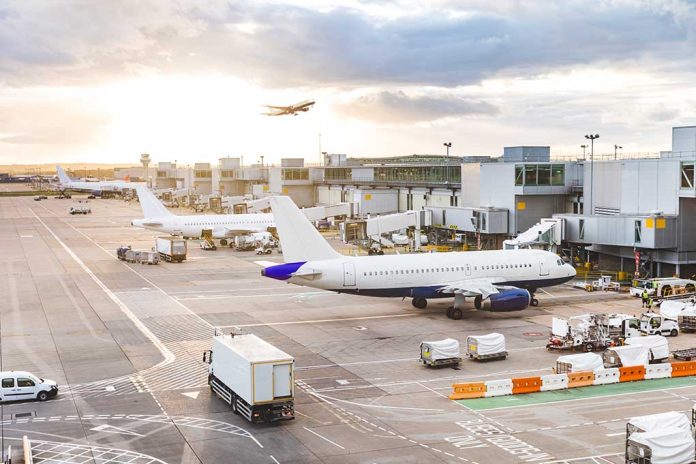
Gunfire strikes American planes in Haiti, prompting US to ban flights amid escalating gang violence and political turmoil.
At a Glance
- FAA bans US flights to Haiti for 30 days after two American planes hit by gunfire near Port-au-Prince
- Spirit Airlines flight diverted after crew member injured; JetBlue and American Airlines suspend operations
- Gangs control 80% of Port-au-Prince, hampering travel and escalating violence
- Haiti faces political instability with new prime minister amid ongoing poverty and security challenges
- UN flights suspended, impacting humanitarian aid and personnel flow into the country
US Implements Flight Ban as Haiti Descends into Chaos
In a shocking development that underscores the deteriorating situation in Haiti, the Federal Aviation Administration (FAA) has imposed a 30-day ban on US flights to the troubled Caribbean nation. This decision comes after two American planes were struck by gunfire near Port-au-Prince’s Toussaint Louverture International Airport, highlighting the dangerous conditions gripping the country.
The ban includes a temporary prohibition on most U.S. flights traveling under 10,000 feet in Haitian airspace, with exceptions made only for emergency flights authorized by the U.S. government with FAA approval. This drastic measure reflects the gravity of the security situation in Haiti, where gang violence has spiraled out of control.
Airlines Respond to Escalating Violence
The incidents that triggered this ban involved a JetBlue plane and Spirit Airlines Flight 951, both hit by gunfire near the airport. The Spirit flight, which had departed from Fort Lauderdale, was forced to divert to Santiago, Dominican Republic, after a crew member sustained minor injuries. In response, JetBlue has canceled flights until December 2, American Airlines has halted flights until at least Thursday, and Spirit has canceled all flights pending investigation.
“The acute and immediate needs of the Haitian people mandate that the transitional government prioritize governance over the competing personal interests of political actors,” stated State Department spokesman Matthew Miller, emphasizing the urgent need for stability in Haiti.
The FAA’s decision, citing “safety of flight risks associated with ongoing security instability,” reflects the dangerous reality on the ground. The U.S. Embassy has warned of “gang-led efforts to block travel to and from Port-au-Prince, which may include armed violence, and disruptions to roads, ports, and airports.”
Humanitarian Crisis Deepens
The flight ban’s impact extends beyond commercial travel, severely affecting humanitarian efforts. The United Nations has suspended its flights to Haiti, a move that UN spokesperson Stephane Dujarric says is “obviously limiting the flow of humanitarian aid and humanitarian personnel into the country.” This suspension comes at a critical time when Haiti desperately needs international support to address its multifaceted crisis.
“As a result, all UN flights have been suspended, obviously limiting the flow of humanitarian aid and humanitarian personnel into the country,” UN spokesperson Stephane Dujarric explained, highlighting the dire consequences of the security breakdown.
The situation in Haiti has deteriorated to the point where gangs now control approximately 80% of Port-au-Prince, despite the presence of a Kenyan-led international force. This gang dominance has led to rampant violent crime, including robberies, rapes, and kidnappings, making daily life a nightmare for Haitians.
Political Instability Fuels Crisis
The flight incidents coincided with a political shake-up in Haiti, as Prime Minister Garry Conille was fired and replaced by businessman Alix Didier Fils-Aime. This change in leadership comes at a time when Haiti is struggling to establish a transitional council aimed at stabilizing the country and preparing for elections in 2026.
The unelected transitional council has vowed to bring the perpetrators of the airline attacks to justice, stating, “This cowardly crime, which threatens Haiti’s sovereignty and security, aims to isolate our country on the international stage. The perpetrators of these heinous acts will be hunted down and brought to justice.” However, given the current state of lawlessness, it remains to be seen how effective these efforts will be.
A Nation in Crisis
Haiti’s ongoing challenges with political instability, poverty, natural disasters, and gang violence have created a perfect storm of crises. The escalation of violence in February, marked by coordinated attacks by armed groups, has only exacerbated the situation. Gangs are now using advanced tactics, including drones and stockpiling weapons, to confront the police force, further destabilizing the country.
As Haiti grapples with this multifaceted crisis, the international community watches with concern. The flight ban, while necessary for safety, further isolates a nation in desperate need of support and intervention. Without swift and decisive action to address the root causes of Haiti’s instability, the country risks spiraling into even deeper chaos, with dire consequences for its people and the region as a whole.






















